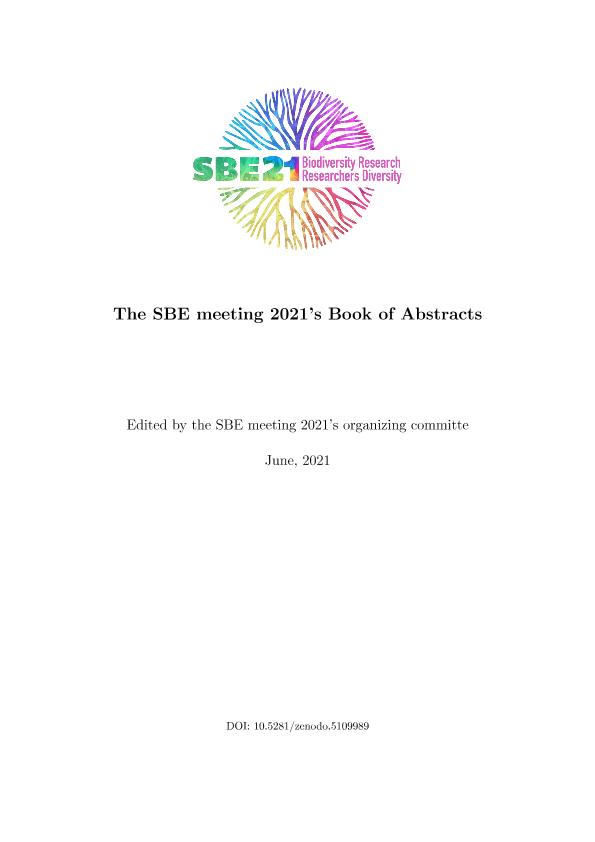Mostrar el registro sencillo del ítem
dc.contributor.author
Roulet, Maria Emilia

dc.contributor.author
Ceriotti, Luis Federico

dc.contributor.author
Sánchez Puerta, María Virginia

dc.date.available
2023-04-04T18:54:20Z
dc.date.issued
2021
dc.identifier.citation
The mitochondrial genome of holoparasites of the family Balanophoraceae has been severely impacted by horizontal gene transfer; II Virtual Meeting of Systematics, Biogeography, and Evolution: The Research of Biodiversity and the Diversity of Researchers; .; Estados Unidos; 2021; 103-104
dc.identifier.uri
http://hdl.handle.net/11336/192761
dc.description.abstract
Plant vascular connections established in a host-parasite relationship allow the passage of water, nutrients, and nucleic acids. This intimate contact promotes the exchange of genetic information between unrelated species, a process named Horizontal Gene Transfer (HGT). Plant mitochondrial genomes (mtDNAs) are frequently impacted by HGT. We deciphered the mtDNA of the holoparasitic angiosperm Lophophytum leandri (Balanophoraceae). This plant grows in Argentina parasitizing roots of the mimosoid legume Parapiptadenia rigida (Fabaceae). The L. leandri mtDNA is 806,114 bp long and has a multichromosomal structure consisting of 50 circular chromosomes (5-72 kb in length). This multipartite genome was recently described in the relatives L. mirabile and Ombrophytum subterraneum. Similarity searches revealed 46.37% of shared regions between the mtDNA of L. mirabile and L. leandri. The L. leandri mtDNA carries 3 ribosomal RNA, 6 transfer RNA, and 35 protein genes representing 7.25% of the genome and are distributed across 23 chromosomes. The remaining 27 chromosomes are devoid of any identifiable coding region. Comprehensive phylogenetic analyses showed that L. leandri harbors 5 foreign and 15 chimeric mitochondrial protein genes as a result of HGT from its legume hosts. To unveil the overall impact of the HGT in the L. leandri mtDNA, we performed BLAST searches against angiosperm mtDNAs. The L. leandri mtDNA presents 48.3% foreign sequences acquired from legumes and 31.9% native DNA, while 19.6% remains undetermined, as it is not similar to any other angiosperm mtDNA. The availability of the L. leandri mtDNA permitted a genus-wide evolutionary assessment. The analyses uncovered the presence of 19 chimeric genes in L. mirabile, representing almost half (43.18%) of the protein genes. Besides, we found evidence for ancient HGT events, in which foreign mitochondrial genes or regions were acquired before the divergence of L. mirabile and L. leandri.
dc.format
application/pdf
dc.language.iso
eng
dc.publisher
Systematics, Biogeography, and Evolution meeting 2021's organizing committe
dc.rights
info:eu-repo/semantics/openAccess
dc.rights.uri
https://creativecommons.org/licenses/by-nc-sa/2.5/ar/
dc.subject
BALANOPHORACEAE
dc.subject
MITOCHONDRIAL
dc.subject
GENOME
dc.subject.classification
Ciencias de las Plantas, Botánica

dc.subject.classification
Ciencias Biológicas

dc.subject.classification
CIENCIAS NATURALES Y EXACTAS

dc.title
The mitochondrial genome of holoparasites of the family Balanophoraceae has been severely impacted by horizontal gene transfer
dc.type
info:eu-repo/semantics/publishedVersion
dc.type
info:eu-repo/semantics/conferenceObject
dc.type
info:ar-repo/semantics/documento de conferencia
dc.date.updated
2022-09-14T16:22:47Z
dc.journal.pagination
103-104
dc.journal.pais
Suiza

dc.journal.ciudad
Cern
dc.description.fil
Fil: Roulet, Maria Emilia. Consejo Nacional de Investigaciones Científicas y Técnicas. Centro Científico Tecnológico Conicet - Mendoza. Instituto de Biología Agrícola de Mendoza. Universidad Nacional de Cuyo. Facultad de Ciencias Agrarias. Instituto de Biología Agrícola de Mendoza; Argentina
dc.description.fil
Fil: Ceriotti, Luis Federico. Consejo Nacional de Investigaciones Científicas y Técnicas. Centro Científico Tecnológico Conicet - Mendoza. Instituto de Biología Agrícola de Mendoza. Universidad Nacional de Cuyo. Facultad de Ciencias Agrarias. Instituto de Biología Agrícola de Mendoza; Argentina. Universidad Nacional de Cuyo. Facultad de Ciencias Exactas y Naturales; Argentina
dc.description.fil
Fil: Sánchez Puerta, María Virginia. Consejo Nacional de Investigaciones Científicas y Técnicas. Centro Científico Tecnológico Conicet - Mendoza. Instituto de Biología Agrícola de Mendoza. Universidad Nacional de Cuyo. Facultad de Ciencias Agrarias. Instituto de Biología Agrícola de Mendoza; Argentina. Universidad Nacional de Cuyo. Facultad de Ciencias Exactas y Naturales; Argentina
dc.relation.alternativeid
info:eu-repo/semantics/altIdentifier/url/https://zenodo.org/record/5109989#.YRxqWdNKhTY
dc.relation.alternativeid
info:eu-repo/semantics/altIdentifier/doi/http://dx.doi.org/10.5281/zenodo.5109989
dc.conicet.rol
Autor

dc.conicet.rol
Autor

dc.conicet.rol
Autor

dc.coverage
Internacional
dc.type.subtype
Reunión
dc.description.nombreEvento
II Virtual Meeting of Systematics, Biogeography, and Evolution: The Research of Biodiversity and the Diversity of Researchers
dc.date.evento
2021-06-19
dc.description.ciudadEvento
.
dc.description.paisEvento
Estados Unidos

dc.type.publicacion
Book
dc.description.institucionOrganizadora
SBE Meeting 2021’s Organizing Committee
dc.source.libro
The SBE meeting 2021's Book of Abstracts
dc.date.eventoHasta
2021-06-23
dc.type
Reunión
Archivos asociados
